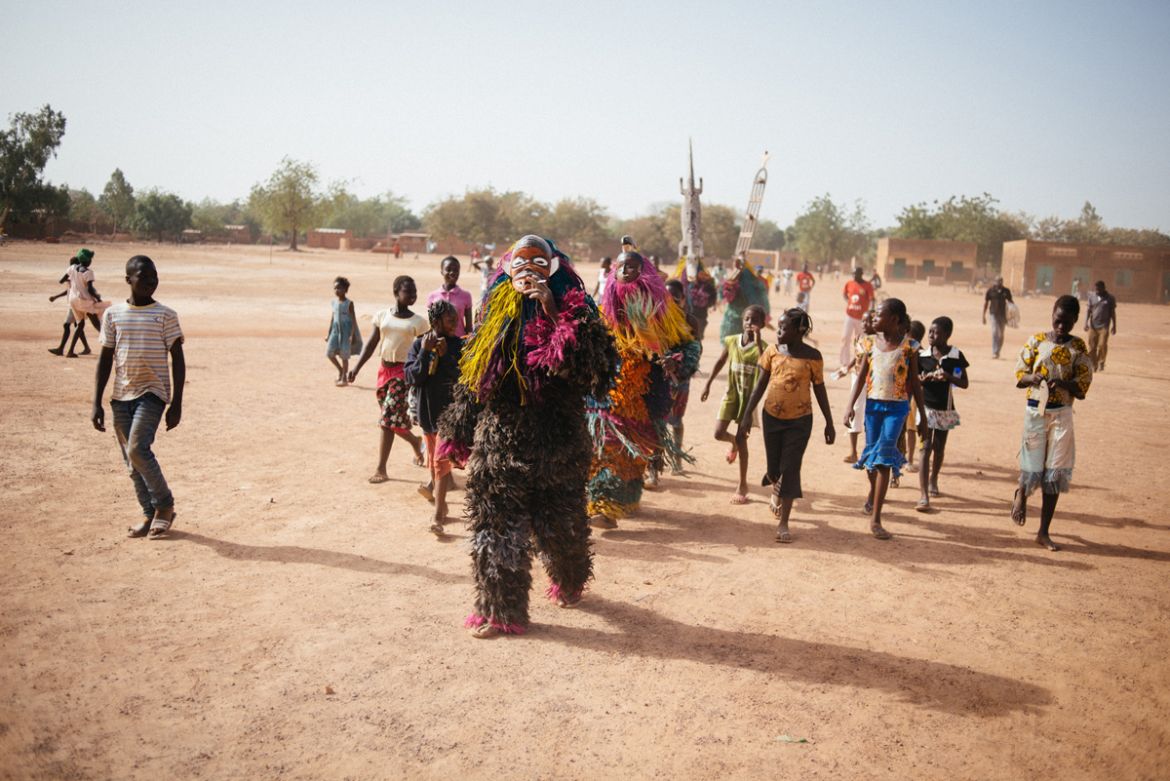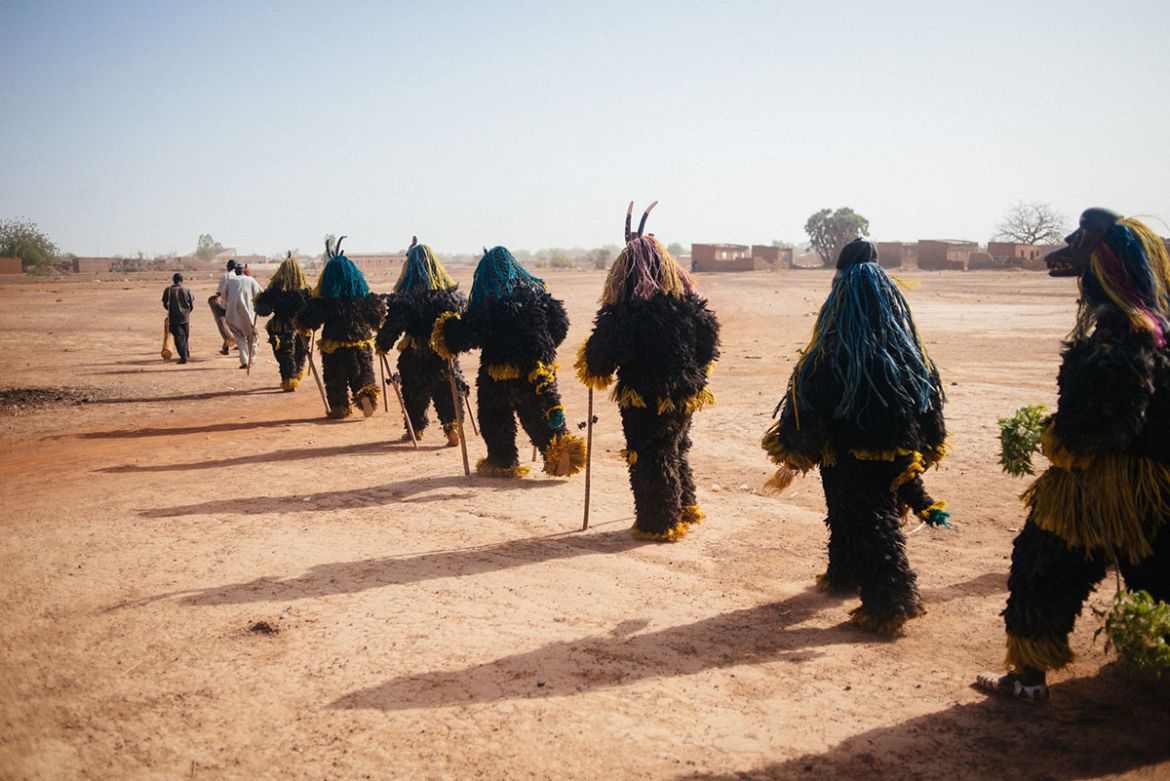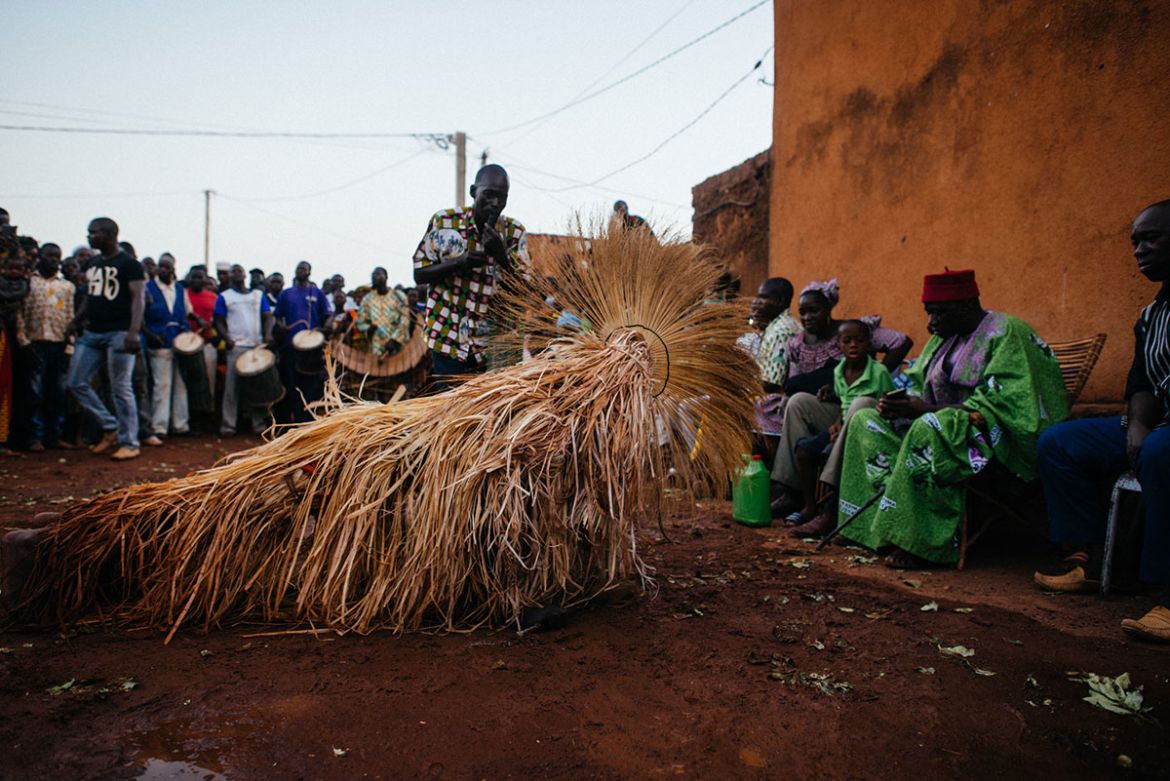In Pictures
In Burkina Faso: FESTIMA, a festival of African masks
The frantic music and dancing transform the mask wearer into a spirit which communicates with ancestors.
![[Jacob Balzani Loov/Al Jazeera]](/wp-content/uploads/2016/03/9e23ce4e00a1417c9d8bc34487c8e040_8.jpeg?resize=1170%2C780&quality=80)
Dedougou, Burkina Faso – The 20th biennial FESTIMA, the largest International Art and Mask Festival in West Africa took place in the town of Dedougou, 250km west of the capital Ouagadougou. Hundreds of traditional masks from six countries – Benin, Ivory Coast, Mali, Togo, Senegal and 50 villages of Burkina Faso, came to life during the festival.
Masks have been an important part of traditional animist beliefs in many African cultures for thousand of years. Made of leaves, straw, wood and textile, the masks symbolise the worship of ancestors and spirits. They play an important role during commemorations of rites and the cycle of life.
According to traditional beliefs, during the ceremony, the frantic music and dancing transform the entranced mask wearer into a spirit which communicates with ancestors. A wise man or translator sometimes accompanies the wearer of the mask during the ritual, helping to interpret the ancestors’ message.
“Of course, these masks are not given full power during the festival,” one musician explained during a break. “Otherwise, you would not even be able to photograph them; nothing would show up in the picture.”
Only a month earlier, the capital of Burkina Faso was devastated by a terrorist attack claimed by al-Qaeda in the Islamic Maghreb (AQIM) and Al-Mourabitoun, which left 30 dead and 56 wounded from 18 different nationalities.
Ki Leonce, executive director of ASAMA, the Association for the Protection of Masks, said the attack left the country shocked because Burkina Faso, which literally means “the land of honest people”, is known for its religious tolerance and peaceful attitudes.
“There are two aspects about masks,” he continued: “One is cult and the other is culture; there might be a religious conflict for people who venerate masks, but there is no conflict from the cultural point. It is our cultural patrimony, every African, every Burkinabe shares it and we should not allow other people to dictate our way of thinking, but preserve our cultural heritage.”
During the festival, masks were incredibly alive and some tourists attended despite the attacks. ASAMA is hoping to obtain funds to invite even more nations and masks to participate in the festival in 2018.

![Biennal FESTIMA / Please Do Not Use [Jacob Balzani Loov/Al Jazeera]--](/wp-content/uploads/2016/03/10224a7fc8aa418198a854a617e8ac99_8.jpeg?fit=1170%2C781&quality=80)
![Biennal FESTIMA / Please Do Not Use [Jacob Balzani Loov/Al Jazeera]](/wp-content/uploads/2016/03/f74128577e1f475cbaa82adaafebd844_8.jpeg?fit=1170%2C781&quality=80)
![[Jacob Balzani Loov/Al Jazeera]](/wp-content/uploads/2016/03/45ab71cd7eae4dc891c96fdcdb49221d_8.jpeg?fit=1170%2C781&quality=80)

![Biennal FESTIMA / Please Do Not Use [Jacob Balzani Loov/Al Jazeera]-](/wp-content/uploads/2016/03/d4a8506395554445994f3f0f03c6c9a9_8.jpeg?fit=1170%2C781&quality=80)
![[Jacob Balzani Loov/Al Jazeera]](/wp-content/uploads/2016/03/230ee2e5cb4c44bfab4bc457fa2e644d_8.jpeg?fit=1170%2C781&quality=80)
![Biennal FESTIMA / Please Do Not Use [Jacob Balzani Loov/Al Jazeera]](/wp-content/uploads/2016/03/a46e5e66143a4992973b715be6c6eeeb_8.jpeg?fit=1170%2C781&quality=80)
![[Jacob Balzani Loov/Al Jazeera]](/wp-content/uploads/2016/03/fa110f26dac240b188b48d8579c28f5b_8.jpeg?fit=1170%2C781&quality=80)
![Biennal FESTIMA / Please Do Not Use [Jacob Balzani Loov/Al Jazeera]-](/wp-content/uploads/2016/03/b9ad0e3924784d0dbc19139079a2d568_8.jpeg?fit=1170%2C781&quality=80)
![Biennal FESTIMA / Please Do Not Use [Jacob Balzani Loov/Al Jazeera]-](/wp-content/uploads/2016/03/bf80bc3989a2407dbcf00c9b80350e3e_8.jpeg?fit=1170%2C781&quality=80)



![Biennal FESTIMA / Please Do Not Use [Jacob Balzani Loov/Al Jazeera]-](/wp-content/uploads/2016/03/2fee12a8558544018427383543146e85_8.jpeg?fit=1170%2C781&quality=80)
![Biennal FESTIMA / Please Do Not Use [Jacob Balzani Loov/Al Jazeera]-](/wp-content/uploads/2016/03/eca724257b844d938ac50d2ef35097cb_8.jpeg?fit=1170%2C781&quality=80)

![Biennal FESTIMA / Please Do Not Use [Jacob Balzani Loov/Al Jazeera]-](/wp-content/uploads/2016/03/ce4cedae63424ed7970bf32f856f4077_8.jpeg?fit=1170%2C781&quality=80)
![Biennal FESTIMA / Please Do Not Use [Jacob Balzani Loov/Al Jazeera]-](/wp-content/uploads/2016/03/510923815230425b82ba01800692b759_8.jpeg?fit=1170%2C781&quality=80)

![Biennal FESTIMA / Please Do Not Use [Jacob Balzani Loov/Al Jazeera]](/wp-content/uploads/2016/03/41cf641b678d4b1db729fe0597637329_8.jpeg?fit=1170%2C781&quality=80)
